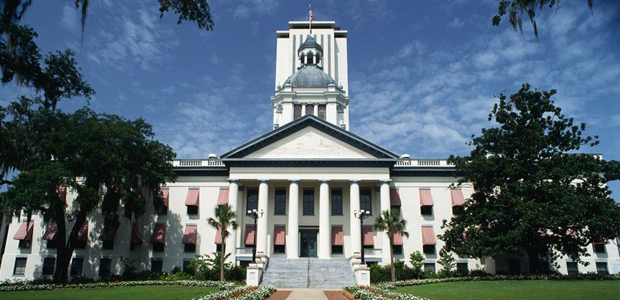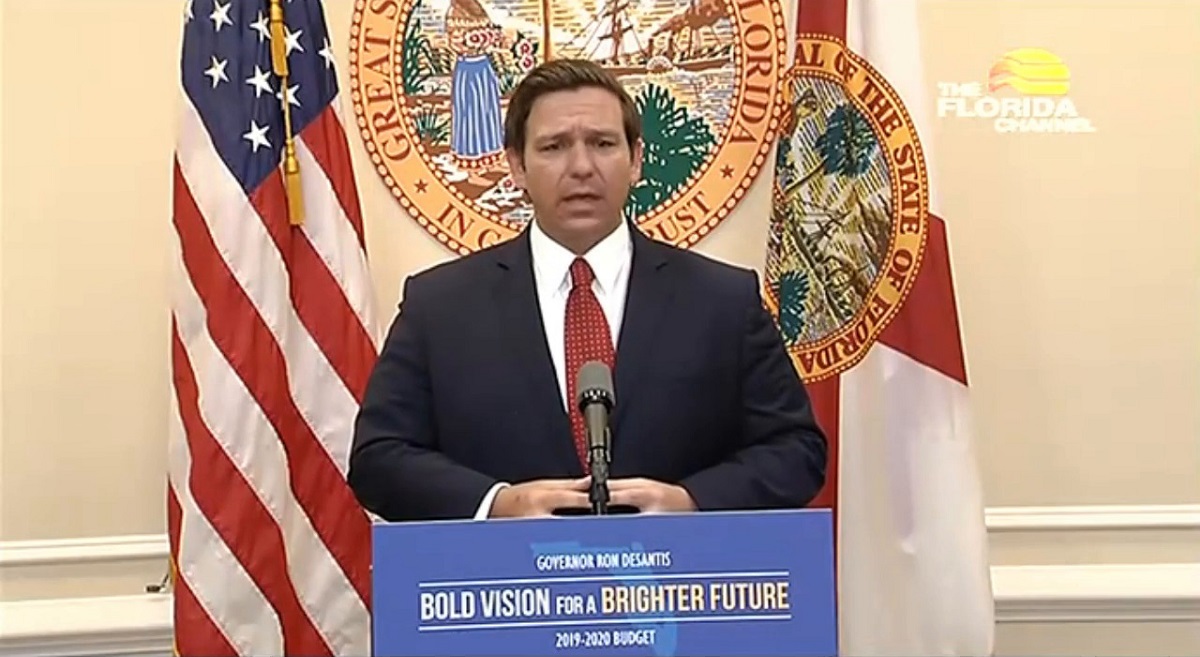2020 FLORIDA LEGISLATIVE SESSION PREVIEW
College and career pathways, higher education finance, and other proposals impacting students

Introduction
The 2020 Florida Legislative Session starts January 14th, with Florida’s education system front and center on the agenda. While school safety and teacher pay dominate many of the conversations surrounding education, talent development continues to be a top priority for policymakers throughout the state. Out of the approximately 3,200 bills proposed to date, which are best poised to impact postsecondary access and attainment for Florida students?
This preview includes some of the top budget priorities and proposals to watch this session.
Budget
According to the Florida Office of Economic and Demographic Research, Florida’s economic forecast continues to be positive, with an estimated 2.5% GDP growth for the 2019-20 Fiscal Year.
Governor Ron DeSantis’ recommended budget for the 2020-2021 Fiscal Year—A Bolder, Brighter, Better Future—outlines his priorities for the coming year with a record-breaking $91.4 billion in funding. This includes a 4.3%, or $1.4 billion, increase in General Revenue (GR) funds, the major funding source for education and many other state government functions.
The Governor continues to support the mission outlined in Executive Order 19-31—Charting a Course for Florida to Become Number 1 in the Nation for Workforce Education by 2030 and Ensuring Florida Students are Prepared for the Jobs of the Future —by continuing to fund programs promoting college completion, student retention, and career and technical education. The budget allocates $26.9 billion for education, including $1.3 billion in operating funds for the Florida College System (FCS) and over $2.7 billion for the State University System (SUS). As in last year’s budget recommendations, there are no increases in tuition and fees at Florida’s colleges and universities.
Some highlights of the Governor’s proposed budget impacting postsecondary education include:
- Workforce Development: adds $11 million (total: $381.4 million) for workforce development programs to support operational expenses.
- Pathways to Career Opportunities Grant Program: maintains last year’s appropriation of $10 million in grants to establish or expand pre-apprenticeship and apprenticeship programs for high school and college students.
- Last Mile College Completion Program: provides $1.5 million to help students who left college with 12 or fewer credit hours remaining to complete their first degree. This program was created by HB 7071(2019) but did not receive funding. Despite lack of funding in last year’s budget, all 28 Florida College System institutions have announced their support of the program.
- Performance Based Incentives for CTE Students: maintains current funding of $14 million for students earning high-demand industry certifications at Florida colleges.
- Work Florida Student Success Incentive Fund at State Colleges: maintains current incentive funding of $10 million to support statewide efforts to align workforce programs offered by the Florida College System to statewide and regional workforce demands and high-wage job opportunities. This would be the program’s second year of funding.
- Work Florida Student Success Incentive Fund at District Postsecondary Programs: adds $5 million to expand the Work Florida Student Success Initiative to include postsecondary certificate training programs offered at the 48 school district-run technical colleges and centers across the state.
- 2+2 Student Success Fund: adds $10 million (total: $40 million) for the 2+2 Student Success Incentive Fund to support college efforts to improve the success of students enrolled in AA programs in completing crucial college credit courses, graduating with AA degrees, and transferring to baccalaureate degree programs.
- SUS Performance Funding: provides an increased investment of $50 million from the state. Also calls for a $50 million increase in the combined institutional investment from state universities. This would result in a total of $660 million available to universities for performance funding: $315 million in state contributions and $345 million in institutional contributions.
Declaring 2020 “The Year of the Teacher,” Governor DeSantis’ budget allocates $13.2 billion in state funding for K-12, increasing last year’s per student funding by $302 to $7,979. The budget includes $602.3 million to increase teacher pay, to bring the minimum salary to $47,500 for teachers across the state. This would make Florida the second highest state for starting teacher pay. The budget also replaces the “Best and Brightest” teacher bonus program with a new $300 million bonus system to reward teachers and principals based on performance and Title 1 status.
Policy
HB 55 and SB 132—Sunshine Scholarship Program
Bill Sponsors: Representative Shevrin Jones (D – West Park) and Senator Oscar Braynon (D – Miami Gardens)
Establishes the Sunshine Scholarship to provide full tuition and fees for eligible students who attend a Florida College System institution, a school district-operated career center, or a charter technical career center. A Sunshine Scholarship program award would apply to tuition and fees after deducting other financial aid sources. To qualify, students must have a household income of $50,000 or less, complete the FAFSA, and maintain continuous full-time enrollment. Additionally, after graduation or disenrollment, students who received the scholarship must live in the state for the equivalent time of the scholarship award or repay the award amount with interest.
CS/HB 171 and CS/SB 372—Postsecondary Education for Certain Military Personnel
Bill Sponsors: House Higher Education and Career Readiness Subcommittee, Representatives Mel Ponder (R – Destin) and Adam Hattersley (D – Riverview), Senate Education Committee and Senator Tom Lee (R – Brandon)
Requires the Board of Governors and the State Board of Education to utilize national best practices to develop a uniform system to award postsecondary credit or career education clock hours for experience and training obtained during military service. Additionally, public postsecondary institutions will be required to waive transcript fees for active duty service members, honorably discharged veterans, and their immediate family members.
CS/HB 187—Postsecondary Education for Secondary Students
Bill Sponsors: House PreK-12 Innovation Subcommittee and Representative Ardian Zika (R – Land O’ Lakes)
Renames “collegiate high schools” as “early college acceleration programs.” This bill states that at a minimum, students who complete two years in early college programs must have the option of completing a CAPE industry certification and earning an associate’s degree through dual enrollment prior to high school graduation.
HB 187 also requires institutions to provide instructional materials to dual enrollment students from public, private, or home education programs. Additionally, the bill establishes new reporting requirements for dual enrollment and early college programs. Beginning in 2021, each postsecondary institution would be required to report the number of students enrolled in dual enrollment or early college, the number of courses completed, clock hours, projected future enrollment, and any barriers in establishing required early college programs. The bill also prohibits FCS institutions from denying eligible students access to a dual enrollment or early college programs unless the commissioner grants the institution a one-year waiver for capacity purposes.
Senator Kelli Stargel (R – Lakeland) has filed SB 1246 – Dual Enrollment, a potential companion bill to CS/HB 187. SB 1246 contains comparable elements related to program reporting, but in addition creates the Dual Enrollment Scholarship Program to reimburse institutions for tuition and fees of courses taken by private or home education students. SB 1246 also includes a calculation for K-12 bonus full-time enrollment funding based on students’ success in dual enrollment courses. The bill also prohibits FCS institutions from denying eligible students from enrolling in dual enrollment courses; however, if the institution is unable to serve the student demand for capacity reasons, they would be required to admit eligible students based on a first-come, first-serve basis rather than complete a waiver process.
HB 383 and SB 876—Historically Black Colleges and Universities Matching Endowment Scholarship Program
Bill Sponsors: Representative Delores Hogan Johnson (D – Ft. Pierce) and Senator Audrey Gibson (D – Jacksonville)
Establishes the Historically Black Colleges and Universities Matching Endowment Scholarship within the Department of Education. The scholarship includes a $2 million appropriation request, and each of Florida’s four public and private HBCUs would be eligible to draw down up to $500,000 each for student scholarships.
CS/SB 418—Workforce Education
Bill Sponsor: Senator Manny Diaz Jr. (R – Hialeah)
Allows school district-operated career centers to offer an Associate in Applied Science (AAS) or an Associate in Science (AS) degree in nursing to students who graduated from a licensed practical nursing program at that same career center. Currently in the public education sector, these degrees are only available through Florida College System institutions.
CS/SB 602—Open Educational Resources Grant Program
Bill Sponsor: Senator Bill Montford (D – Tallahassee)
Creates the Open Educational Resources Grant Program to support FCS and SUS institutions in developing open educational, or free, resources for general education courses including open-access textbooks and instructional materials. If passed, this bill would require a legislative appropriation for implementation.
CS/HB 613—Higher Education
Bill Sponsors: House Higher Education and Career Readiness Subcommittee and Representative Ray Rodrigues (R – Ft. Myers)
This bill contains several provisions related to state universities. It creates the State Universities of Distinction program to support non-preeminent universities that offer programs of national or state excellence, aligned to workforce needs, and foster innovation in key sectors. It amends the SUS performance metric on graduation to include two-year graduation rates for students who transferred from an FCS institution and creates an additional metric of six-year graduation rate for students who received a Pell Grant. Additionally, the bill requires universities to report trend data on faculty and administrator employment with annual budget requests.
The senate has filed two potential companion bills to CS/HB 613. Senator Manny Diaz Jr. (R – Hialeah) has filed SB 1402 –Higher Education, which includes the creation of the State Universities of Distinction and changes to the SUS performance-based funding metrics. SB 72—Postsecondary Education by Senator Kelli Stargel (R – Lakeland) contains similar provisions related to the State Universities of Distinction, but also includes changes to the requirements for the Benacquisto Scholarship Program and to distribution, eligibility, and reporting requirements for the Florida Student Assistance Grant Program.
HB 693 and SB 188—Student Eligibility Requirements for State Financial Aid Awards and Tuition Assistance Grant
Bill Sponsors: Representative Carlos Guillermo Smith (D – Orlando) and Senator Annette Taddeo (D – Miami)
Outlines criteria for the state to classify certain immigrant students (i.e. those granted temporary protected status or deferred action for childhood arrivals status) as residents for the purposes of state financial aid and tuition assistance eligibility.
HB 887 and SB 828—Florida ABLE Program
Bill Sponsors: Representative Ray Rodrigues (R – Ft. Myers) and Senator Lizbeth Benacquisto (R – Ft. Myers)
This bill would save from repeal the Florida ABLE (Achieving a Better Life Experience) Program until 2025. The Florida ABLE Program, an organization under the Florida Prepaid College Board, administers private tax-exempt savings accounts for eligible Floridians with disabilities to use on qualified expenses, including education and job training.
HB 993 and SB 1550—High School Graduation Requirements
Bill Sponsors: Representative Richard Stark (D – Weston) and Senator Janet Cruz (D – Tampa)
For students entering ninth grade in 2021-22, these bills would add the completion of the Free Application for Federal Student Aid (FAFSA) as a requirement for a standard high school diploma. The bills also allow students to opt out of this graduation requirement by having a parent submit a letter to their school district. Students 18 or older may submit the letter themselves.
SB 1568—Education
Bill Sponsor: Senator Travis Hutson (R – St. Augustine)
SB 1568 requires school districts to make efforts to provide students with paid work experiences through educational training and work-based learning opportunities. The legislation also classifies individuals enrolled in pre-apprenticeship programs and students enrolled in work-based learning courses as state employees so they may receive state workers’ compensation. SB 1568 also redefines terms related to apprenticeships and pre-apprenticeship programs and expands the ability to sponsor apprenticeships to schools, workforce boards, community and faith-based organizations, or any entity preapproved by the Department of Education.
Additionally, SB 1568 requires career education programs to include in their articulation agreements at least three mathematics pathways that align with meta-majors and career tracks. It also requires the Articulation Coordinating Committee to convene a workgroup consisting of academic affairs administrators and faculty from FCS and SUS institutions to identify the three aforementioned pathways.
Finally, the bill makes changes to the FTE funding calculation for select CAPE industry certifications.
SB 1578—Education
Bill Sponsor: Senator Travis Hutson (R- St. Augustine)
SB 1578 requires the Department of Education to deliver career landscape information to guidance counselors in public schools for student distribution. This information would include data on the most in-demand jobs in Florida and their corresponding average starting salaries and educational requirements, the average cost of college, the average cost of monthly student loan payments and student loan default rates, graduation rates, and information about Career and Technical Education (CTE). To gather this data, the Department of Education would be authorized to enter a memorandum of understanding with any state agency.
Additionally, the bill allows FCS institutions to sponsor charter schools and expands SUS institutions’ authority to do so by authorizing them to sponsor charters based on regional workforce demands. SB 1578 also outlines charter sponsor accountability framework. New charter schools established through the bill’s provisions must be funded as a traditional school program, making them eligible to receive funds from the Florida Education Finance Program (FEFP).
SB 1844—Florida Bright Futures Scholarship Program
Bill Sponsor: Senator Bobby Powell (D – West Palm Beach)
SB 1844 updates the eligibility criteria for the Bright Futures Scholarship Program by removing a requirement that applicants may not have been found guilty of or entered a plea of no contest to a felony charge.




